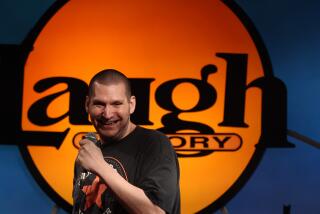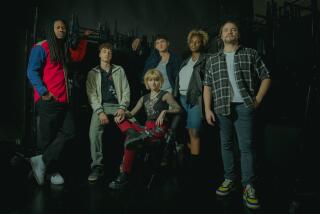Show of Esteem : 12 Camarillo Patients Stage Rock Musical Before Peers
- Share via
Andy R., 26, and institutionalized for antisocial behavior, looked particularly troubled Friday morning. It was an act.
“He’s tired of this place,” music therapist Laura Kanofsky explained to an audience of Andy’s fellow residents at Camarillo State Hospital. “Have any of you ever felt this way?”
The hospital residents shouted, murmured and nodded their agreement, and the premiere performance of “Aliens in the Cactus Garden” was under way.
The show is a rock musical, written and staged as an esteem-builder and educational tool by two music therapists at the Camarillo hospital. The therapists, Kanofsky and Hank Wadsworth, wrote the show, cast 12 of their mildly developmentally disabled clients in the show and set the performers before an audience of about 300 of their peers.
The 90-minute show featured six songs, including “You Just Want to Be Free,” rapped by Donna S. in a bright red bandanna and socks, and “What You Have Inside is ENUF,” led by hospital staffer Jack Cheney, the only non-resident in the cast.
Since 1984, the therapists have collaborated on several shows for clients, the staging and costumes growing more elaborate each year. Rehearsals for “Aliens in the Cactus Garden” began six months ago, Wadsworth said.
The performers came from the 140 clients, aged 14 to 57, in the hospital’s Program 9 category. Most of them, program director Paul Hoyt said, “came in through the court system. They’ve run into some problem with the law, and had severely antisocial behavior.”
Andy R., with a likable stage presence and a strong resemblance to Tony Dow in his Wally Cleaver days, had the lead role. He played George Binkman, a client at “Slippery Springs State Hospital” who, with assistance from two space aliens, learns the rewards of self-reliance, self-discipline and self-esteem. But Binkman begins in a foul mood.
“This place sucks. That’s my attitude,” said the Binkman character at one point.
Another character asked what it would take to turn him around.
“Love,” blurted a voice in the audience. But the authors had a more complicated answer in mind.
“I wish we could wave a wand,” said one of the performers, who portrayed a hospital therapist. “But they have to do it themselves.”
Some in the audience were mentally ill and some were developmentally disabled. Most were patient and enthusiastic, despite the many half-remembered lines and halting set changes that cropped up in the production.
“I’m blind in one eye and I have astigmatism in the other, so I have to sit close,” one show-goer in the front row said.
“Hot-diggity dang, I think I’m going insane,” she added later. When the music started, she was up and dancing.
Rebecca Albrecht, a psychiatric social worker at the hospital, was also in the audience, marveling at 16-year-old Stephanie W.’s command of her lines. “This is good for the staff,” Albrecht said. “Because it’s a chance to see the clients in a different perspective. You see different skills and abilities, and sometimes you can turn around and use those skills to their advantage.”
The performance ended with the cast united on stage, bowing to prolonged applause. George Binkman had found self-esteem, the visitors from space were on their way, and the theme song swelled on the sound system.
“This was their baptism of fire, and they came out of it really well,” Wadsworth said of the cast.
Andy R., having just completed his first dramatic role, was satisfied.
“The hardest part was all the rehearsing, the memorizing,” he said. “But it showed me that I could do things on my own.”
More to Read
The biggest entertainment stories
Get our big stories about Hollywood, film, television, music, arts, culture and more right in your inbox as soon as they publish.
You may occasionally receive promotional content from the Los Angeles Times.











